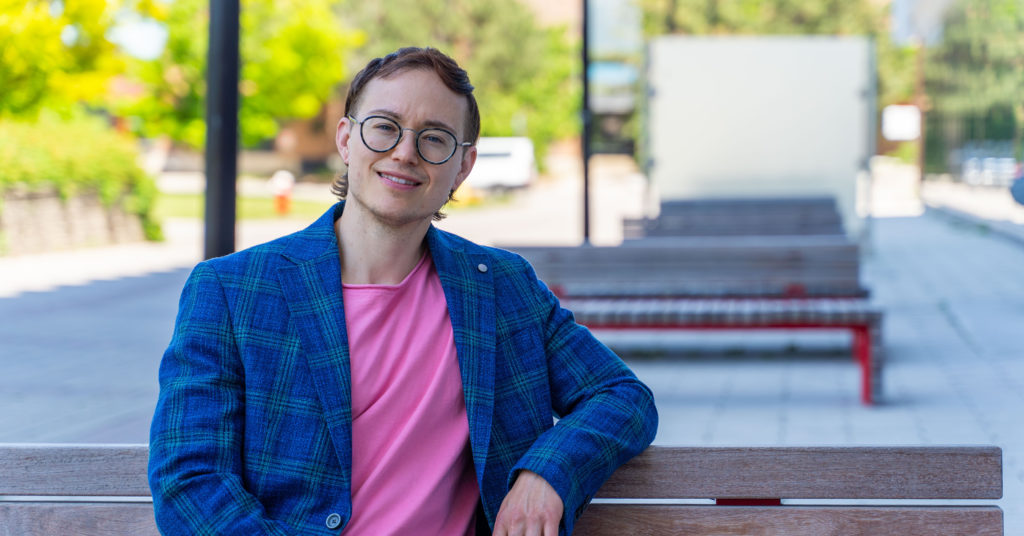
“I’m a community engaged trans and queer scholar, with an emphasis on community engagement and knowledge mobilization, which to me, is making sure that as I’m building new knowledge, it’s being communicated, discussed and debated amongst my communities.
Being at York has provided me with an amazing opportunity and community, to discuss some of the most pressing issues of our time, especially around gender, around 2SLGBTQ inclusion, social change and equity, and gender-affirming care.
I’m an interdisciplinary scholar, so I blend together gender studies, social work, health professions education, bioethics. It’s an eclectic smattering of my own training, as well as theories from a lot of different disciplines.
I hope that people can engage with my TikToks in a way that is disarming in some capacity, because some of what I discuss is new and developing knowledge. People don't always have schemas for some of the ideas and research that I’m attempting to disseminate. Learning new things can be a bit uncomfortable at times, as you confront new ideas that challenge dominant world views.
I don't get too heavy into like theory or methodology things like that on TikTok. The Prof Kinnon on TikTok is not the same Prof Kinnon you’ll meet in the classroom or at an academic conference. I apply a lot more rigor to my academic writing and my teaching, whereas my TikToks are often done on the fly - often while I am in the middle of analyzing data or writing a new paper!
Some of these ideas that I share are very new and I’m looking to get some early feedback from communities about a certain theory or hunch I’m reflecting on. I want to know, what do other people in the world, outside academic journal articles, think of these ideas?
Creating TikToks to share my research is rewarding. The feedback on ideas that are still percolating is super helpful to me. I can go to the TikTok comments section and see how these ideas are resonating with people, and that gives me something more to think about.
I also hear from 2SLGBTQ, especially trans youth, who have found my content has helpful during difficult times. I get emails from people who are developing new programs or policies, people considering grad school, people who are like thinking about York as a potential place to do their masters or PhDs. I end up doing a bit of academic advising, which is a nice part of the job.
My latest research project called the “Re/DeTrans Canada study” (Twitter: @ReDeTransCanada) looks at experiences of non-linear gender transition, detransition, and retransition. In some cases, transition regret or changing gender identity. These are important yet overlooked experiences which , for some people in the trans community, can feel like a taboo topic. And for this reason there are very little social supports and a lot of stigma directed toward people who detransition/retransition.
I had a bit of trepidation with starting to talk publicly about this project, because it's heavily politicized and polarizing in and outside trans communities. But I have been overwhelmingly met with a lot of support, and a lot of people who also in the comment section will say that they like share some personal experiences, or just how much that this research means to them. And there is generally a lot of misunderstanding and misinformation circulating about detransition. So that definitely gives me some motivation, and makes me feel like the work that I’m doing is meaningful.
One of the goals of this project is to inform 2SLGBTQ-serving community organizations, looking at ways to develop support programs, different policies and better public education, public conversation.”
Kinnon R. MacKinnon received his BSW from York University, MSW from Ryerson University, and PhD in Public Health Sciences from the Dalla Lana School of Public Health, University of Toronto. Drawing from critical, interdisciplinary training in gender studies, social work, and public health, Kinnon's program of research investigates the social and structural dimensions of health and social care access (specialization: 2SLGBTQ populations). He has specific interest in tracing how the structural landscape - such as policy and legislative decisions - mediates access to support services in local contexts. Kinnon's practice background includes support group facilitation in the areas of gender-affirming care, and men's body image. Reflecting a transformative vision, he also designs and studies gender-affirming care education aimed to impact change at the practice and policy levels.
